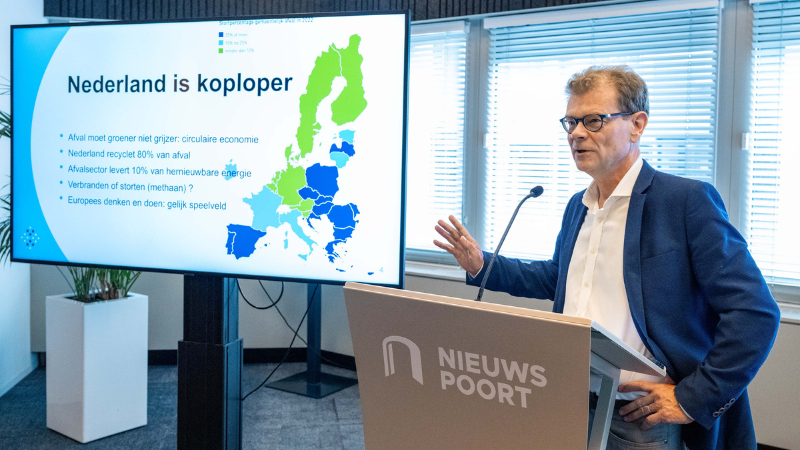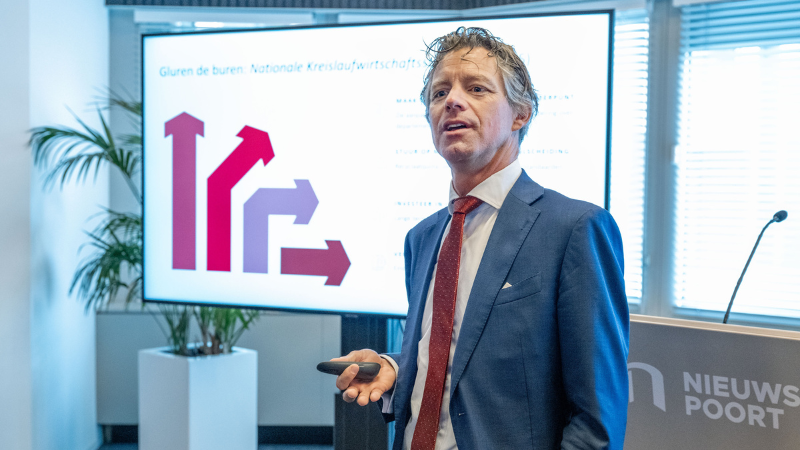
News
12 September 2025
PWC study shows tax measures will have the opposite effect
Less recycling and sustainability, waste exports, delay to storing CO₂ in Aramis, discouraging innovation and a loss of jobs
The Dutch Waste Management Association commissioned PwC Strategy& to undertake a 'level playing field' assessment of the waste industry. This study was done in view of the government's plans for the waste and recycling industry. These plans are expected to raise €567 million every year in tax revenue. PWC was asked to study the impact on the waste and recycling industry. The study was undertaken in June, July and August and was presented on 11 September in The Hague, the Netherlands.
‘The report concludes that the tax measures will have the opposite of the intended effect. They will lead to less recycling and sustainability, waste exports, a delay to the storage of CO₂ in depleted gas fields (project Aramis), or even its cancellation, a loss of jobs and reduce innovation’, according to the Dutch Waste Management Association.
In April 2025 the Dutch government announced new tax measures affecting waste businesses. These measures are supposed to raise €567 million annually in tax revenue, from 2030. The current waste tax and CO₂ levy already lead to significant costs. Waste sorting and recycling leads to large waste streams which are incinerated by energy from waste plants (EfW). These residues amount to over 40% of the waste incinerated in the Netherlands. The EfW plants charge over 40% to the waste sorting and recycling businesses. This makes the sorting and recycling businesses in the Netherlands even more expensive than those in other countries. The impact on this is greatest on imported waste. Because of the levies, operators in the Netherlands become uncompetitive, while waste imports are necessary to utilise the current recycling capacity. Furthermore, sorting and recycling businesses in the Netherlands become even more expensive compared to new (virgin) products.
 Bart van de Leemput, chair of the Dutch Waste Management Association: ‘The announced tax measures will have an adverse impact on the waste and recycling industry.’
Bart van de Leemput, chair of the Dutch Waste Management Association: ‘The announced tax measures will have an adverse impact on the waste and recycling industry.’
(copyright-free photograph: Fotopersburo Dijkstra / Cor Salverius).
Sorting and Recyling will be reduced
According to PwC there is a real risk that sorting and recycling activities in the Netherlands will be reduced, as waste is exported and virgin products increase in volume. Hence these levies conflict with the objective of the Netherlands to be a leader in recycling. The Dutch Waste Management Association emphasises that many plastics recycling companies have gone bankrupt in the past two years. This measure will lead to even more bankruptcies.
‘Additionally, this does not encourage energy from waste (EfW) plants to invest in sustainability. For example, think of the construction of CO₂ capture systems and CO₂ storage in depleted gas fields - project Aramis’, explained Bart van de Leemput, chair of the Dutch Waste Management Association, ‘The levies are expected to lead to major waste exports and a significant reduction in business profits (EBITDA 2030: -125% / 2035: -133%, see PwC report) and job losses.’
Higher CO₂ emissions and less influence on sustainability
There is a risk that in the sort term waste exports will lead to higher CO₂ emissions because waste is sent to landfills in other countries or because it is incinerated in plants in other countries with a lower energy and CO₂ efficiency. In the medium term, the Netherlands could lose its influence on making the waste incineration process more sustainable (using CO₂ Capture and Storage - CCS) because incineration is done outside the Netherlands. Due to the tax measures, the incineration of residual wastes by EfW plants will unquestionably get more expensive. Part of these higher costs will be passed on in the fees charged to consumers, businesses and sorting and recycling companies. ‘The competitive position of sorting and recycling businesses in the Netherlands will worsen relative to manufacturers of fossil plastics and recycling businesses in other countries’, according to PwC. ‘That increases the risk of exporting wastes and recycling operations to Germany, Scandinavia, Eastern Europe and the illegal sector’, adds the Dutch Waste Management Association. ‘In future, the Netherlands may not be able to process its own waste’.
Other consequences
In the Netherlands approximately 80% of waste is recycled. Approximately 11% is incinerated in EfW plants, with the recovery of energy and resources. Approximately 6% finds a beneficial application and 3% is landfilled safely without harming the environment. The levies will also have an impact on landfill sites and companies which upgrade bottom ash. Less incineration will lead to less bottom ash which will lead to less landfilling of upgrading residues. There is a real risk that the bottom ash and landfilling operations also move to other countries. That would have an adverse impact on the quality of waste processing in the Netherlands.
Not a level playing field
The taxes on incinerating and landfilling waste in the Netherlands are already among the highest in Europe. Germany (91 EfW plants) does not levy incineration or landfill taxes. Belgium (16 EfW plants) has different levies for incineration and landfilling, and these are much lower than in the Netherlands. Similarly, there is no CO₂ levy on waste processing in Belgium. In France (116 EfW plants) the incineration levy depends on the energy performance of the plant and there is no CO₂ levy on waste processing. Sweden (37 EfW plants) no longer has an incineration tax, but the plants are covered by the European emission trading system (EU ETS). Romania does not have any EfW plants, waste is mostly landfilled, incurring a low landfill levy. Again, there is no CO₂ levy on waste processing.
This lack of a level playing field gives the waste processing industry in neighbouring countries and Eastern Europe a significant competitive advantage. This will further increase the export of waste and recycling.
 Wouter van Aggelen, director of Corporate Affairs at Remondis: ‘We need a different approach, which promotes the use of recycled products at the start of the supply chain, and which helps to increase the waste collection and recycling capacity in the Netherlands.’
Wouter van Aggelen, director of Corporate Affairs at Remondis: ‘We need a different approach, which promotes the use of recycled products at the start of the supply chain, and which helps to increase the waste collection and recycling capacity in the Netherlands.’
(copyright-free photograph: Fotopersburo Dijkstra / Cor Salverius).
Member of the European Parliament, Sander Smit (European People's Party / Farmer–Citizen Movement) asked the European Commission to assess the impact of the Dutch government's plan to impose an annual €567 million tax on the waste sector. He raised concerns that this measure could make Dutch waste processing economically unattractive, lead to increased waste exports to countries with lower environmental standards and undermine EU goals on circular economy, carbon capture, and methane reduction.
Working towards a better plan
‘The announced tax measures will have an adverse impact on several objectives of the Netherlands’, emphasises Bart van de Leemput, chair of the Dutch Waste Management Association. ‘In the end they will lead to less recycling, less sustainability, more waste exports, delays to CO₂ storage in depleted gas fields (project Aramis) and a loss of jobs and innovation. The industry is ready to recover even more resources from wastes, and make a significant contribution to the circularity objectives. But that requires a stable investment climate. Hence we urge the government to defer these tax measures and instead make a better plan, together with the industry, which will lead to more sustainability and protect the circular infrastructure in the Netherlands.’

